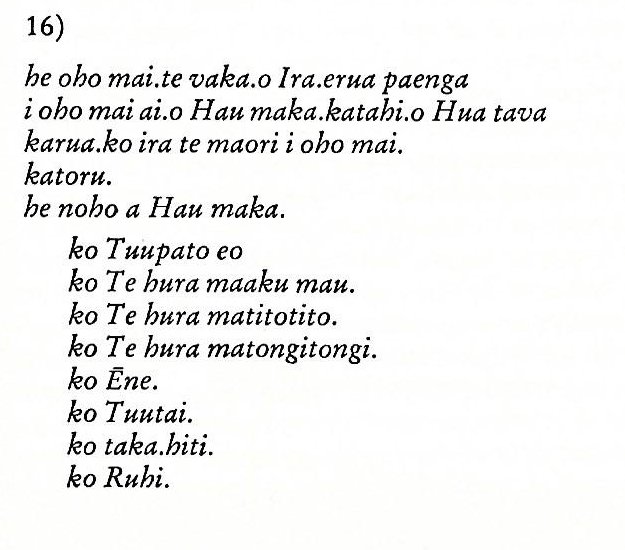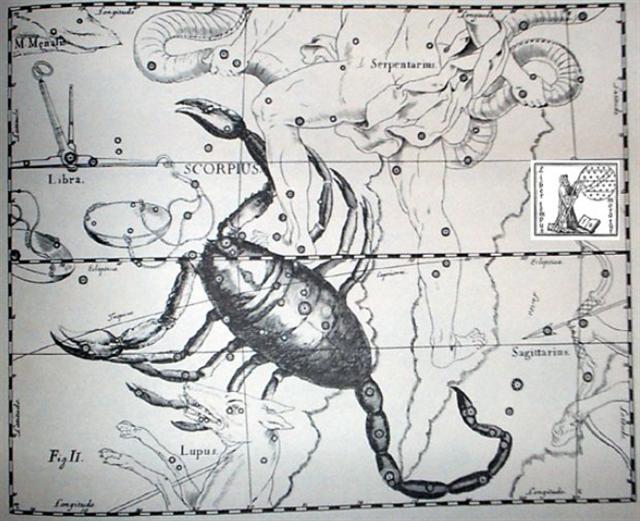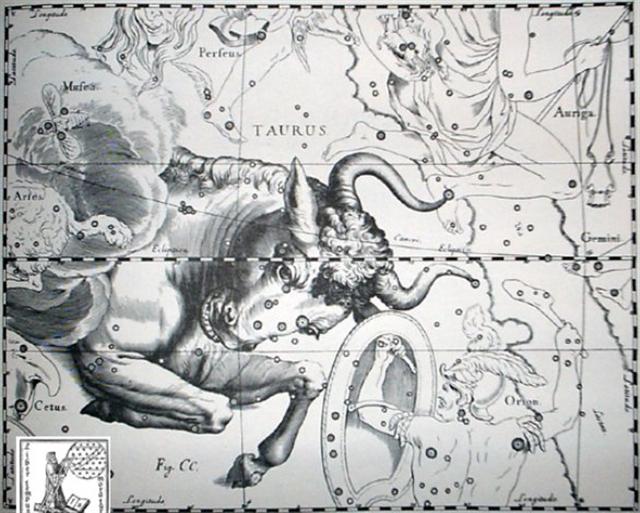
| he ea a hau maka
he oho ki toona hare he |
Hau Maka arose [he ea] and
went to his house [hare].
When he arrived [he tuu], he told Hua Tava of the
conversation: 'This is what the king said to me, so that I may
go and instruct the young men.'
Hua Tava answered [he ki mai] Hau Maka: 'Since this is
what the king told you, go and deliver (the order) to all; set
out, look at the land, and find a place where
the people (aniva) can
live!'
Hau Maka spoke to his first-born son [atariki] Ira, to
Raparenga, and also to the sons of Hua Tava - |
| tuu he ki i te
ki kia hua tava.penei e ku ki |
| mai ana te ariki
a Matua kia au mo unga |
| i tau ngaio ena. |
| he ki mai a hua
tava.kia Hau maka. |
| ana ki ro atu te
ariki kia koe ka unga ana(-) |
| nake.ka oho ka
ui te kainga mo noho o |
|
te aniva.he ki a Hau maka.ki taana |
| kope atariki.kia
Ira.kia
Raparenga. |
| ki te ngaio
tokoa a Hua tava. |
|
E:15 |
| ko
Ngukuu . a Hua tava.ko
Ringiringi |
namely, Kuukuu A Hua Tava,
Ringiringi A Hua Tava, Nonoma A Hua Tava, Uure A Hua Tava, and
Makoi A Hua Tava. |
| a Hua tava.ko
Nonoma.a Hua tava. |
| ko
Uure.a Hua tava. Ko
Makoi.a Hua |
| tava. |
| he ki a Hau
maka.kia Ira.ka hoa toko(-) |
Hau Maka said [he ki] to [kia]
Ira: 'Take the crew and launch your canoe; set sail and look for
the land in the direction of the rising sun (a roto i te raa).
When you sail and look to this direction, you will find it
lying there, its contours will stand out
[revareva] on high in the midst of the (rising)
sun (i roto i te runga i te raa) (i.e. in the east).'
That was the first point. |
| rua vaka ko nga
kope ka oho ka ui te kainga |
| a roto i te
raa.ana oho ana ui.na e.moe ena. |
| e tau e
revareva ena. i runga.i roto i te
raa. |
| katahi. |
| he hakahi.tahi a
Hau maka.i te mee i ti(-) |
Hau Maka gave a complete description
of all the things his dream soul had seen. At that, all of them
said in amazement. 'Ah! Ah!' He described everything in the
smallest detail (? ka paepae-tahi-ro).
That was the second point. |
| kea e toona
kuhane.anakeanake aaaaa |
| aaaaa ka
paep(a)e tahi ro ina etahi i toe. |
| karua. |
| he oho.ananake
ngaio he tono i te vaka he hoa |
All [ananake] the young men [ngaio]
got ready, launched the canoe, and anchored it out at sea [ki
te tai].
They took on yam roots [te uhi], sweet potatoes [te
kumara], hard fruit (? makoi), and bananas [te
maika].
They stored [he ngatu] all sorts of food [anakeanake
te kai] in the canoe, and the canoe set sail. |
| ki haho ki te
tai.he too i te uhi i te kumara i |
| te makoi i te maika.anakeanake
te kai. |
|
he ngatu ki roto ki te vaka. he oho
mai te vaka |
| Anake, unique. T Pau.:
anake, unique, to be alone. Mgv.: anake, alone,
single, only, solely. Mq.: anake, anaé, id. Ta.:
anae, all, each, alone, unique. Anakena, July.
Ananake, common, together, entire, entirely, at once,
all, general, unanimous, universal, without distinction, whole,
a company; piri mai te tagata ananake, public; kite
aro o te mautagata ananake, public; mea ananake,
impartial; koona ananake, everywhere. Churchill.
Gatu. Gaatu, totora reed. Gatu: 1. To press, to
tighten, to squeeze. 2. To pack tight. 3. To pull suddenly, to
give a jerk. I ka hakarogo atu, ku eke á te kahi, he gatu
mai, as soon as he felt the tuna be, he pulled in [the line]
with a sharp jerk. 4. To kick. 5. E gatu te hagu, to wait
for something impatiently (gatu, breath). 6. Shortly,
very soon. He tu'u gatu, he is coming shortly, he is just
about to arrive. Vanaga. Bulrush, reed. Gaatu (gatu)
1. To feel of, to pinch, to throttle with the hands, to touch,
to press (gaatu); gatuga, pressure; gatugatu,
to trample down. T Mgv.: natu, to press out linen, to
squeeze a person or a sore place. Mq.: natu, to pinch.
Ta.: natu, to pinch, to bruise. 2. To suppurate. 3.
Gatu mai gatu atu, sodomy. Gatua (gatu 1),
tractable, to press. Churchill. Scirpus riparius var.
paschalis. Barthel 2. |
|
E:16 |
| he oho mai.te
vaka.o Ira.erua paenga |
When Ira's canoe sailed off, members
of two families were onboard - that is, in the first place [katahi],
(those of) Hau Maka and, in the second place [karua],
those of Hua Tava. In the third place [katoru], Ira was
the crew chief [te maori] who went on the voyage. |
| i oho mai ai.o
Hau maka.katahi.o Hua tava |
|
karua.ko ira te
maori i oho mai. |
| katoru. |
|
Pae. 1. To end, to come to an end; ku-pae-á taaku
kai, I have no more food; pae-atu, to leave en
masse; ku-pae-atu-á tagata ki Hangaroa tai. everybody
has left for Hangaroa Bay. 2. To start, to break out (of
wars, fights: taûa); ku-pae-á te taûa, the fight,
the war, has started. 3. Dressed, edged stones anciently used to
enclose a permanent umu; paepae wall of undressed
stones built as protection against the wind; also any other
protection. Pa'e: Of a boat, to deviate, to drift, to
stray under the effects of currents or winds; ku-pa'e-á te
vaka i te tokerau, the wind has made the boat deviate from
its course. Vanaga. Paega: 1. Dressed stones forming the
foundations of the ancient houses or of the walls of the
monumental ahus; hare paega, house with stone
foundations; paega-ahu, ahu wall. 2. Household, people
who live in a hare paega. 3. To lay stones on the bottom
and against the sides of a hole: he-paega i te rua.
Vanaga. 1. Enough. 2. Division of a subject (paiga).
Pau.: paega, a party, a side. Ta.: pae, division,
part. 3. Threshold, sill, joist. P Ta.: pae, sill, joist.
4. To exhaust, to finish, past; e ko pae, impregnable;
hakapae, to exhaust, to finish, to end, to execute, to
accomplish, to conclude, to consummate, to consume, to achieve,
to acquit. Paea: 1. Enough, past. 2. To decay, to waste
away; paea tooa, to deprive. Paega, foundation.
Paepae, pavement, plank, canoe; hakapaepae, to lay
planks, to floor. P Pau.: paepae, a raft. Mgv.: paepae,
a pavement, to lay up stones with regularity into a wall. Mq.:
paepae, elevated pavement on which the house is built.
Ta.: paepae, pavement, raft. Paero, all, totalit,
to sweep off all. Churchill. |
| Maori. Wise teacher;
tagata maori rogorogo, person who can recite the signs of
the tablets; maori hare, house builder; maori îka,
healer expert in treating fight injuries. Name of the country of
origin of Hotu Matu'a which he fled with his people
following a cataclysm in a land called Hiva. Vanaga. a.
Of manual training: dexterity, handy, industry, artisan. b. Of
mental training: erudite, finesse, cleverness, adroit,
ingenious, intelligent, lucid, sage, sense, science, talent. c.
The resultant: memorable, renowned, of good reputation.
Tagata maori, carpenter; rima maori, left hand,
tae maori, incompetent; maori ke, judicious, sly;
maori ke avai, adroit. T Pau.: maori, maohi,
indigenous, sure, safe, perfect. Mgv.; maori, belonging
to the country, native of the Polynesian race, right hand. Mq.:
maoi, native, natural, common, ordinary. Ta.: maori,
maóhi, proper name of the indigenous people of Polynesia,
native, good, perfect. Churchill. |
| he noho a Hau
maka. |
Hau Maka stayed behind [he noho] |
|
ko
Tuupato eo |
with Tuu Pato Eo (that is the master of the
nets). |
|
ko
Te hura maaku mau. |
These 7 names are omitted in the translation
by Barthel. |
|
ko
Te hura matitotito. |
|
ko
Te hura matongitongi. |
|
ko
Ēne. |
|
ko
Tuutai. |
|
ko
taka.hiti. |
|
ko
Ruhi. |
Ruhi
could perhaps refer to the Summer Maid:
... Antares, visible in the morning sky of
December-January, came to stand for summer heat; hence the saying, 'Rehua
cooks (ripens) all fruit'. The generally accepted version of the
Rehua myth, according to Best, is that Rehua had two wives,
the stars on either side of Antares. One was Ruhi-te-rangi or
Pekehawani, the personification of summer languor (ruhi), the
other Whaka-onge-kai, She-who-makes-food-scarce before the new
crops can be harvested ...
At the
time of Bharani the Sun would have reached Antares in "October 15 (288),
and 8 * 36 = 288 (= 432 - 144).
|
Sumerian W-B. 144 |
|
1 Alulim |
28,800 |
|
2 Alagar |
36,000 |
|
3 Enmenluanna |
43,200 |
|
4 Eumengalanna |
28,800 |
|
5 Divine Dumuzi |
36,000 |
|
6 Ensibzianna |
28,800 |
|
7 Enmenduranna |
21,000 |
|
8 Ubardudu |
18,600 |
|
9 |
- |
|
10 |
- |
|
Sum |
241,200 (→ 24 * 12) |
|
|
Sumerian W-B. 62 |
|
1 Alulim |
67,200 |
|
2 Alagar |
72,000 |
|
3 Kidunnushakinkin |
72,000 |
|
4 ... ? |
21,600 |
|
5. Divine Dumuzi |
28,800 |
|
6 Enmenluanna |
21,600 |
|
7 Enzibzianna |
36,000 |
|
8 Eumenduranna |
72,000 |
|
9 Arad-gin |
28,800* |
|
10 Ziusudra |
36,000 |
|
Sum |
456,000 (→ 45 * 6) |
|
|
Berossos |
|
1 Aloros |
36,000 |
|
2 Alaparos |
10,800 |
|
3 Amelon |
46,800 |
|
4 Ammenon |
43,200 |
|
5 Megalaros |
64,800 |
|
6 Daonos |
36,000 |
|
7 Euedoraches |
64,800 |
|
8 Amempsinos |
36,000 |
|
9 Opartes |
28,800 |
|
10 Xisuthros |
64,800 |
|
Sum |
432,000 (→ 4 * 108) |
|
|
The Bible (King James' verison) |
|
1 Adam |
130 |
|
2 Seth |
105 |
|
3 Enoch |
90 |
|
4 Kenan |
70 |
|
5 Mahalel |
65 |
|
6 Jared |
162 |
|
7 Enoch |
65 |
|
8 Methuselah |
187 |
|
9 Lamech |
182 |
|
10 Noah: until Flood |
600 |
|
Sum |
1,656 (→ 4 * 414) |
|
|
* Campbell has 28,000 here, which, however, does not agree
with the sum 456,000. |
... The position of Nunki (the Star of the Proclamation of the
Sea) was in right ascension day *288 (as counted from 0h at the time of
rongorongo) ...
... The Julian calendar day Thursday, 4 October 1582
was followed by the first day of the Gregorian
calendar, Friday, 15 October 1582 (the cycle of weekdays was not
affected) ...
... 288 =
12 * 24 = 6 * 48 = 3 * 96. Finally 4 * 96 = 384 = 13 * 29½ + ½ ...
|
CLOSE TO THE
SUN: |
|
SEPT 20 |
21 (*184) |
EQUINOX |
23 |
24 |
25 (268) |
 |
 |
 |
 |
 |
 |
|
Ga7-14 |
Ga7-15 |
Ga7-16 (185) |
Ga7-17 |
Ga7-18 |
Ga7-19 |
|
Heart-5 (Fox)
σ
Scorpii
(247.0),
HEJIAN
=
γ
Herculis (247.2),
ψ
Ophiuchi (247.7) |
ρ
Ophiuchi (248.1),
KAJAM (Club) =
ω
Herculis
(248.3),
χ
Ophiuchi (248.5),
SHE LOW (Market Tower) =
υ
Ophiuchi,
Tr.
Austr. (248.7), ζ Tr. Austr. (248.8) |
Al Kalb-16 (The Heart) /
Jyeshtha-18 (Eldest) /
ANA-MUA-1 (Entrance pillar)
ANTARES
= α Scorpii
(249.1),
MARFIK (Elbow) = λ Ophiuchi,
φ Ophiuchi (249.5), ω Ophiuchi (249.8) |
γ Apodis (250.1), σ Herculis (250.3), θ Tr. Austr.
(250.6), τ Scorpii (250.7) |
HAN = ζ Ophiuchi
(251.0) |
ζ
Herculis,
η
Tr. Austr.
(252.1), η Herculis, β Apodis (252.5) |
 |
|
Nov 23 |
24 |
25 |
26 (330) |
27 |
28 |
|
°Nov 19 |
20 |
21 (325) |
22 (*246) |
23 |
24 |
|
'Oct 27
(300) |
28 |
29 (*222) |
30 |
31 |
'Nov 1 |
|
"Oct 13 |
14 |
Tagaroa Uri 15 |
16 |
17 (290) |
18 |
|
DAY 247 |
248 |
249 (= 432 -
183) |
250 |
251 |
252 |
|
CLOSE TO THE FULL
MOON: |
|
MARCH 22 |
23 |
24 |
EQUINOX |
26 (*370) |
27 (86) |
|
Net-19 (Crow)
AIN (Eye) =
ε Tauri,
θ¹
Tauri,
θ²
Tauri (65.7) |
no star listed (66) |
no star listed (67) |
Rohini-4 (The Red One) /
Pidnu-sha-Shame-4 (Furrow of Heaven)
/
ANA-MURI-2 (Rear pillar - at the foot of which was the
place for tattooing)
ALDEBARAN
= α Tauri
(68.2),
THEEMIN = υ² Eridani
(68.5) |
no star listed (69) |
no star listed (70) |
 |
|
May 25 |
26 |
27 (*432) |
28 (148) |
29 |
30 |
|
°May 21 |
22 |
23 (*428) |
24 (144) |
25 |
26 |
|
'April 28
(*403) |
29 |
30 (*40) |
'May 1 |
2 |
3 (123) |
|
"April 14
(104) |
15 |
16 (*26) |
17 (*392) |
18 (108 + 365) |
19 |
|
DAY 65 (104
- 39) |
66 |
67 (= 4 *
108 - 365) |
68 |
69 |
70 |

|





